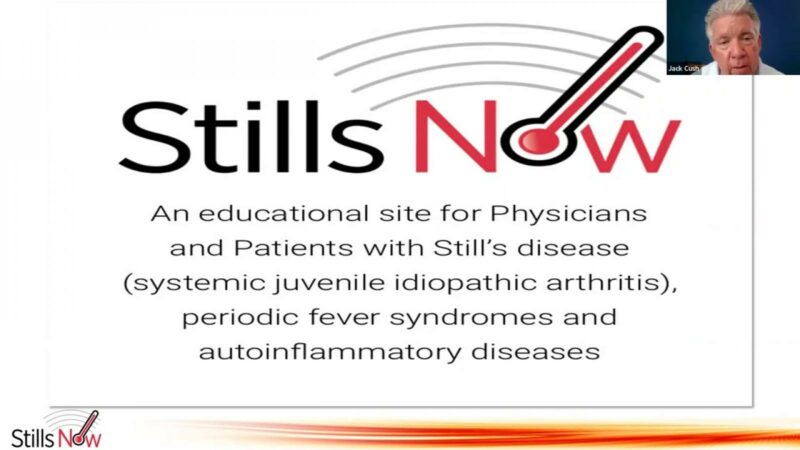Editor’s note: this blog originally appeared July 12, 2022, and is being shared again as a Best of 2022. Enjoy!
When dealing with a new diagnosis, especially for rare diseases, there may be misconceptions or myths.
Still’s disease and autoinflammatory disorders are rare conditions unified by recurrent fevers and inflammation of skin, joints, and other organs. While labs often support the diagnosis, these conditions are best diagnosed by genetic testing, or by specific criteria (in the absence of a genetic test). The following is a table that lists common misconceptions (myths) and their clarifying explanations.
|
Concerns & Misconceptions |
Clarification(s) |
|
All fever is worrisome |
Still’s and other autoinflammatory disorders typically have fevers above 102oF. Fever less than 101oF are not typical of these disorders. Importantly, fever with these conditions are chronic (daily) or cyclical. Doctors should evaluate fevers above 102oF if present for more than 2-3 wks. |
|
If I don’t meet full criteria, I don’t have the disease. |
Still’s and other Systemic Autoinflammatory Diseases (SAIDs) fall into a spectrum of diseases that share many symptoms, but have subtle differences. Meeting criteria increases the odds of having specific diagnosis. Not every patient will meet full criteria, and some patients may have another diagnosis that mimics Still’s or SAIDs. (Note: Nearly half the patients followed in the NIH Auto-inflammatory disease clinic have not yet met criteria or been given a known genetic diagnosis) |
|
Is this an infection? Are antibiotics necessary for my treatment? |
It is important that infectious causes be excluded; this happens during the initial evaluation period when you may receive antibiotics, while being evaluated for infections. Still’s and autoinflammatory diseases are caused by inflammation, not infection. Hence, antibiotics are usually of no value. |
|
Is my condition contagious? |
Still’s and Autoinflammatory diseases are not infectious and not contagious. To have either of these diagnoses, a negative evaluation for infection (and cancer) is usually required. There are no reports of this condition spreading to close contacts or family members. |
|
Is my condition genetic (can I pass this on to my children)? |
The cause of Still’s disease is unknown; and there are no cases of inherited Still’s disease. Many of the systemic autoinflammatory diseases will have a known genetic cause and disease is usually evident from birth. Still’s disease is not inherited but is usually acquired during childhood or before the age of 35 years. |
|
I will have long term complications from this disease. |
Risk of complications tend to be greatest in those who are undiagnosed for a prolonged period, as chronic inflammation may lead to joint damage, mobility issues and potential organ damage. If promptly diagnosed and treated, the risk of long-term complications is low. You should discuss the potential complications of your condition with your rheumatologist. |
|
The risk of medications outweighs benefit of treatment.
|
Damage from uncontrolled inflammation is a certainty and far more worrisome than the rare or uncommon risks with medications. Medications to control inflammation may have side effects but these are often mild, manageable and would uncommonly lead to long- term complications. The disease is far more damaging and concerning than the drugs we use to manage the disease. |
|
Is there a cure for my condition? |
While there are many effective treatments for your condition, currently there is no known cure. The goal of treatment is to control symptoms and prevent damage or progression of these disease. |
|
Autoinflammatory is the same as autoimmune disease |
Autoinflammatory diseases are different than autoimmune disease. Both are considered forms of arthritis or rheumatic disease, because the joints may be affected. Autoinflammatory immune responses are triggered by the “innate immune system” leading to rapid inflammation in many parts of the body. This is your body’s first line of immune defense against environmental factors or infections. Such first line immune responses starts quick and ends quick. This is what happens when you prick your skin with a thorn or get an acute infection. These (normal) inflammation responses become abnormal and cause disease when they persist or don’t “shut off”. Inflammation is driven by neutrophils (white blood cells), cytokines and inflammatory mediators, causing systemic inflammation throughout the body (resulting in fevers, rashes, joint swelling, and fatigue, that may become chronic or recurrent. Autoimmune diseases occur with dysfunction of the “adaptive immune system”, where the responses are unrelated to infection. Following an initial innate immune response, the adaptive immune system recognizes and fights the immune challenge, often by making specific antibodies. Examples of autoimmune disease include lupus and rheumatoid arthritis (RA). Rheumatologists are experts in both autoinflammatory and autoimmune diseases and can help patients with the diagnosis and best treatments. |
|
Will this affect my fertility |
Female and male fertility is generally not affected by Still’s or autoinflammatory diseases. Yet during periods of uncontrolled, untreated, high inflammation, fertility is temporarily impaired. It is important that you discuss your plan for pregnancy, contraception or breast-feeding when you are diagnosed. |
|
Is pregnancy a problem, might itbe a problem, or did pregnancy cause my diagnosis? |
Most people diagnosed with Still’s disease and Autoinflammatory disease are young adults, half being women of child-bearing age. Thus, pregnancy commonly arises before, or after, these conditions are diagnosed, and are unrelated and unaffected by these conditions. |
|
I will not be able to undergo elective surgeries in the future.
|
These conditions do not require the involvement of a surgeon. It is important to know that during periods of uncontrolled high inflammation, it is best to avoid elective surgery. Once, your disease is controlled on medications, most patients can undergo elective surgeries including eye surgery, dental surgery, or cosmetic procedures. |
|
Why did my doctor not consider other diagnoses? |
In the course of being evaluated it is likely that your doctor(s) may have considered the fever causing mimics (disease look-alikes), including other autoinflammatory diseases, infection, certain cancers (e.g., lymphoma), sarcoidosis, inflammatory myositis, lupus, reactive arthritis, hepatitis, vasculitis or polymyalgia rheumatica. |
Related Content
-
January 1, 1970
When dealing with a new diagnosis, especially for rare diseases, there may be…
-
July 22, 2022
-
January 1, 1970
It was great to be back at an ACR annual meeting, this one…
-
July 28, 2022
-
September 6, 2022
Featuring a discussion with Dr. Susan Shenoi from Seattle Childrens Hospital
-
June 17, 2022









